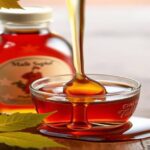With its unique and delightful taste, Maple syrup is a natural sweetener produced in North America. People have been savoring its distinct flavor and health benefits for many centuries. This golden liquid, derived from the maple tree sap, is not just for pancakes and waffles. Its scope and benefits extend well past breakfast, offering a range of nutrients, antioxidants, and other natural substances that promote overall health. This article will delve into maple benefits and scientifically proven maple syrup health benefits and potential as a valuable addition to one’s diet.
The Nutritional Profile of Maple Syrup
Maple syrup is not just a sweetener but adds nutritional value as well. From its helping, it is evident that it includes minerals essential to maintain health, including calcium, potassium, iron, zinc, manganese, etc. As opposed to refined sugar, most of the calories in maple syrup come from these nutrients rather than just calories, reducing the chances of further problems.
1.1 Rich in Antioxidants
A standout benefit of maple syrup is its high degree of antioxidants. It mostly helps to stop the oxidation process of free radicals and volatile unwanted chemicals stored in the body, often leading to conditions like heart and cancer. Over 24 different antioxidant properties are contained in maple syrup.
1. 2 Low Glycemic Index
It’s important to note that while maple syrup has a lower GI than white cane sugar, it should be consumed in moderation. High-fiber foods benefit people with diabetes and those at risk of developing the disorder, as they help regulate glucose levels. However, even though maple syrup does not cause a sharp increase in glucose levels, it still affects blood sugars. Therefore, it’s crucial to consume it cautiously, especially if you’re managing glucose production in the body.
2. Maple Syrup Anti Inflammatory And More
Chronic inflammation, often referred to as ‘self-etching, ‘is linked to multiple health issues, particularly cardiovascular diseases, diabetes, and autoimmune diseases. The active compounds in maple syrup, such as polyphenols, are associated with anti-inflammatory properties, which may positively impact maple syrup consumption. Several studies have suggested these compounds prevent the release of many different inflammatory mediators that are elevated in chronic conditions.
2. 2 A Proven Way to Reduce Cardiovascular Disease Rate
The main reason behind the onset of cardiovascular diseases is believed to be inflammation. These antioxidants are said to reduce the level of inflammation and play an essential role in impeding heart diseases. In addition, consuming maple syrup helps normalize high blood pressure because it increases potassium levels, which aids in preventing heart diseases.
2. 2 One Of The Top Maple Benefits is Promoting Digestive Health
However, maple syrup has more benefits as a source of nutrients; it also has high amounts of anti-inflammatory content that is good for digestion. Chronic inflammation of the bowel tissues can lead to inflammation (IBD) and irritability ( IBS-bowel syndrome). Another known antioxidant found in dietary supplements is that it could help alleviate the lining of your intestine and cause less damage as you eat due to poor digestion.
3. Maple Syrup and Immunity Support
Immune System: Immunity protects the body from threats, including infections and sicknesses. Maple syrup contains zinc and manganese immune factors. Zinc is essential for the synthesis and activation of immune cells. In contrast, manganese is a cofactor in many cellular antioxidant defense systems against infections.
3.1 Improving Antimicrobial Activity
New studies suggest that maple syrup helps antibiotics work better, especially against bacterial infections. Maple syrup contains small amounts of phenolic compounds, and research has demonstrated these compounds to be effective antibacterial agents during infection defense. It could make maple syrup not just a healthy food but possibly even the equivalent of bacterial malware!
4. Energy Source: Maple Syrup
Good For Athletes And Active People, Maple Syrup Keeps You Going! It consists of fast, easy-to-digest carbohydrates, giving instant energy. This maple syrup energy is accompanied by great nutrients, which synthetic power assets do not offer.
4.1 Reductions in Athletic Performance
Energy during training and competition is everything to an athlete. One such energy source is maple syrup, which offers a blend of natural sugars that can be used before or during activity. It also contains minerals that allow the body to restore some of those lost electrolytes from sweat so you can perform and recover better.
4.2 Promoting Muscle Recovery
The body needs to restructure muscle tissues damaged by intense physical activity. Maple syrup is an antioxidant, and because of that, it helps reduce oxidative stress caused by exercise, leading to a faster recovery of the muscles. Even more, maple syrup is rich in magnesium, which helps to produce collagen and maintain healthy joints and muscles.
5. Maple Syrup and Skin Health
Maple syrup offers internal health benefits and is also good for the skin. Its antioxidant activity helps keep skin healthy by protecting it from damage caused by free radicals that would otherwise lead to premature aging. It is also a natural humectant, allowing the skin to hold onto its moisture content to keep it hydrated, giving it a glow!
5.1 Anti-Aging Properties
This incredible natural resource is home to various phytochemicals that reduce fine lines and wrinkles. These antioxidants are particularly beneficial in fighting oxidative stress, one of the primary reasons your skin ages rapidly. These antioxidants also neutralize free radicals and hence help the skin stay firm with a youthful look.
5.2 Natural Skin Exfoliant
Maple syrup is also a natural exfoliator. When mixed with other natural ingredients like oatmeal or yogurt, it opens up congested pores and removes dead skin cells from the back of your facial area to make you glow. It helps with smooth exfoliation, giving flawless skin texture and an added glow.
6. Maple Syrup and Bone Health
Bone health is vital to overall well-being, especially as we age. Maple syrup is also a good source of calcium, magnesium, and manganese, which are important for bone health.
6.1 Preventing Osteoporosis
Osteoporosis: Weak and brittle bones are a condition that plagues older adults. Maple syrup is a good source of calcium + magnesium – an excellent combination that supports bone health (and decreases your risk for osteoporosis). Manganese is important in bone formation and maintenance, which makes maple syrup a friendly food for our bones.
6.2 Improving the Absorption of Calcium
Maple syrup contains manganese, a mineral that greatly impacts bone health. It even helps with calcium absorption in other foods to promote stronger bones. This dual action of reducing demineralization and increasing remineralization enhances maple syrup’s ability to prudently maintain healthy bones and prevent disorders related to age-dependent bone loss.
7. Maple Syrup and Mental Health
We now understand the boundless importance of mental health as part of general well-being and care. Importantly, zinc and manganese, the nutrients contained in maple syrup, are instrumental in brain health and, therefore, are critical for mental health.
7.1 Reducing Depression and Anxiety
Zinc is a mineral that is known to be involved in the regulation of mood, and the absence of the mineral has been connected to depression and anxiety. The provision of a natural source of zinc in maple syrup can henceforth be helpful in mental health therapy while clearing the symptoms of these mental disorders.
7.2 Supporting Cognitive Function
The antioxidants in maple syrup protect the brain cells from the destruction caused by oxidative stress, and they can effectively alleviate or even remove cognitive impairment so that the disease risk associated with Alzheimer’s is minimized. Consequently, the sugar that is dried out and then used in pancakes is truly enjoyed, and a well-cooked hen’s egg is just a small part of what you can make a delicious meal using the syrup.
8. Maple Syrup as a Natural Sweetener
Though maple syrup may offer additional health benefits, it still is primarily a natural sweetener. As the number of people looking for sugar alternatives increases, maple syrup provides a healthier option and nutritional benefits.
8.1 A Better Alternative to Refined Sugar
Refined sugar is often called “empty calories.” It indeed has absolutely no nutritional value. However, it is very dangerous because of the numerous health complications associated with it, which include obesity, diabetes, and heart disease. The only source of memory of ancient times was voice and body movements, which are the primary means we use to communicate across the globe.
8.2 Versatile in the Kitchen
In addition to its incredible health benefits, maple syrup is a versatile kitchen ingredient. It can be incorporated into various dishes, from breakfast foods such as oatmeal and pancakes to savory sauces and marinades. Its robust and intricate flavor accentuates savory and sweet dishes, making it popular in most homes.
9. The Environmental and Ethical Factors of Maple Syrup
In addition to its health benefits, maple syrup is an environmentally friendly and ethical sweetener. While its health benefits may be somewhat more moderate, the low-impact maple syrup production makes it an excellent choice for the environmentally conscious.
9.1 Sustainable Production
Maple syrup production is sustainable since it taps the subsequently refreshed trees’ sap, sequestering carbon and cleaning air molecules from the atmosphere. To a significant extent, it supports the local economy, creating natural farming processes in regions such as the northern part of the United States and Canada, where the food is grown and produced.
9.2 Supporting Farmers and Traditions Consumers
who select maple syrup will support local farmers and areas that depend on this agricultural product. Maple syrup mechanisms are frequently small-scale, several times possess families, and pass from inheritors to inheritors. While they do this, these ancient procedures endure, safeguarding local productions.
10. Potential Risks Of Maple Syrup
Although the value of maple syrup is high, it is essential to consume it sensibly. All sugarcane is high in sugar, which can cause weight, diabetes, and dental problems.
10.1. Increased Sugar Intake
Maple syrup contains sugar, and although the glucose amounts may be moderate, large quantities of sugar can raise blood sugar levels. Use caution for diabetes patients or those who wish to limit weight.
10.2 Dental Risks
Using syrups poses a risk of tooth decay, indicating the user should be careful about the impact on dental health. Since much glucose decays in the mouth and the sugar contents of untreated extracts are high, dental decay should be avoided..getMethod
11. How To Incorporate Maple Syrup To Your Diet
One can become tastier and healthier with natural sweeteners in one’s daily routine.
11.1 Breakfast Foods
This natural sweetener is an accepted topping for pancakes, waffles, and oatmeal. Still, it can also be eaten at breakfast in yogurt or smoothies or poured over other fresh fruits.
11.2 Baked Foods
Maple syrup is a good sugar substitute that adds moisture to muffins, cookies, or other baked goods. High levels of soda, then flavor, their better restart.
12. A Comparison Between Maple Syrup and Some Other Natural Sweeteners
One natural sweetener we could use to replace sugar and find a healthier alternative is maple syrup. Knowing how maple syrup compares to other sweeteners can be valuable information for deciding what cuts and what does not.
12.1 Maple Syrup vs. Honey
Maple syrup and honey are natural sweeteners that contain antioxidant properties. Still, the two substances differ in flavor, profile, nutritional status, and ability to influence blood sugar levels. Honey may have a higher glycemic index rating than maple syrup, indicating that blood sugar will rise faster with honey. However, when taken in small quantities, they are better options than refined sugar.
12.2 Maple Syrup + Other Liquid Sweeteners – Bee Honey, Brown Rice Syrup, Agave Nectar, etc.
Another natural sweetener that has become popular is agave nectar, which also has a low GI value. Meanwhile, it is also a high fructose fruit, which, in large amounts, can harm your metabolism. Maple syrup: Balanced sugar levels, added nutrients, Natural sweetener health benefits.median-2
13. Various Grades of Maple Syrup and How to Use Them
Different grades of maple syrup have different flavors and uses in cooking. By understanding these differences, you can ensure that you choose the syrup that will work best for your needs.
13.1 Grade A Maple Syrup
This is the most commonly available maple syrup and comes in Golden, Amber Agave Nectar, and Dark grades. Golden maple syrup is the lightest color and mild-tasting, good for pancakes and wafflAmbermber is deeper from the pinkest pink hue, ideal for everyday use and all recipes.
13.2 Grade B Maple Syrup
Grade B, often labeled “Grade A Very Dark,” has a strong flavor and is generally used in cooking rather than on the table. Its robust flavor makes it an ideal sweetener for dishes that call for strong flavors.
14. The Story and Culture of Maple Syrup
Maple syrup is deeply interwoven with the cultural heritage of its people, especially in North America. Maple sap has been harvested and boiled down to syrup for centuries, with locations in North America becoming early participants due to their indigenous peoples.
14.1 Indigenous Practices
Indigenous peoples in the northeastern United States and eastern Canada were the first groups known to have produced maple syrup. The practice was handed down from generation to generation, and it became their diet, which has its roots in this approach.
14.2 Modern Maple Syrup Processing
Currently, maple syrup production has become a major industry in North America, especiaCanada,h is the largest producer. Although production has changed with modern machinery, it still maintains many traditional methods and tools, continuing the cultural heritage of maple syrup production.
15. Conclusion
Good old maple syrup is rich and delicious when you need a pick-me-up, but it also contains minerals that can change your mineral ‘math’ for the better. Its myriad benefits — from antioxidant and anti-inflammatory to the support it can provide for immune health, digestive health, and even mental well-being–make maple an essential component in any diet. Moderation is key to a healthier everyday life as it contains sugar. Still, the benefits of adding maple syrup to your day are overwhelming. From adding it to your morning porridge to baking with sweet treats or livening up savory dishes, maple syrup is a healthy and versatile option that you should have in the cupboard.










